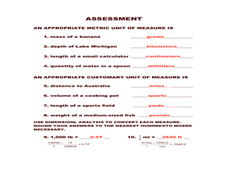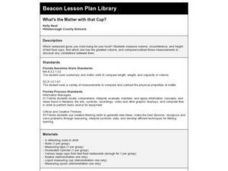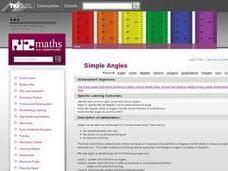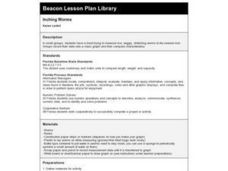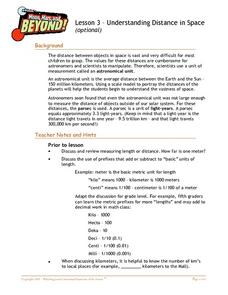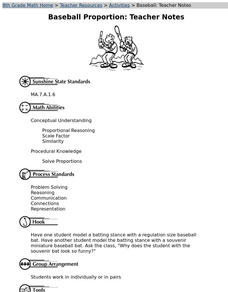Curated OER
Algebra/Geometry Institute: Area, Circumference, Perimeter
Pupils solve area problems. In this area, circumference, and perimeter lesson, students solve area and perimeter problems using standard and metric units of measure. They identify the best customary unit of measure for a given...
Curated OER
Genetic Variations in Hand Span Size
Students study genes. In this biology lesson plan, students measure their handspan size to determine if one pair or many pairs of genes control that trait.
Curated OER
What's the Matter with that Cup?
Fourth graders measure volume, circumference, and height of fast food cups, find which one has the greatest volume, and compare/contrast those measurements to discover any correlations between them.
Curated OER
Simple Angles
Third graders identify and construct right, acute and obtuse angles and begin to appreciate the degree and unit of measurement of angle. They know the degree value of angles that are simple fractions of a whole turn know that the angle...
Curated OER
Scale Matters
Third graders study the meaning of the digits an any whole numbers with up to 3 decimal places. They order decimals with up to 3 decimal places and perform measuring tasks, using a range of units and scales.
Curated OER
Perimeter
Students use their hands, feet, computer, and rulers to measure the perimeter of objects. In this measurement lesson plan, students measure objects around the room and computer generated shapes.
Curated OER
Shaquille O'Neal Hand/Foot Span
Eighth graders measure foot length and hand span in this experiment to determine the ratio. They apply the ratio to determine Shaquille O'Neal's hand span if given his shoe size.
Curated OER
Inching Worms
Third graders have a blast trying to measure live, wiggly, stretching worms to the nearest inch. Groups record their data onto a class graph and then compare characteristics. They share their findings with the rest of the class. Fun lesson!
Curated OER
Is It There?
Students participate in a lesson designed to illustrate these concepts using simple materials. They use Science process skills to observe, measure, predict, make inferences, and communicate while completing the activity. Proper safety...
Curated OER
Understanding Distance in Space
Students discover the vocabulary used for distances in space and review measurement units and instruments before creating a scale model of the planets. They determine how to calculate the relative distances between the planets using a...
Curated OER
Baseball Proportion
Eighth graders measure regular baseball bats and souvenir bats in centimeters. They determine how tall a person would be to be in proportion to the souvenir bat, create a poster depicting the person, and explain the proportional...
Curated OER
Boxing On
Students participate in five center activities in which they construct three dimensional objects using cubic centimeter manipulatives such as sugar cubes and toothpaste boxes. They determine the volume of the objects. They build a model...
Curated OER
Circles Minilab
Young scholars learn how to measure the diameter and circumference of a circle. For this circle lesson, students organize their data to create a graph. Young scholars utilize their graph to make an inference about the slope of pi.
Curated OER
Puzzling Perimeters
Third graders use estimation, fractions and decimals to determine the perimeter of objects in the classroom. They are given a worksheet with a list of the items on it. The worksheet has columns beside each of the items for estimation and...
Curated OER
Mathematics In You
Learners construct ratios using the hand as data. They use examples of cortical and trabecular bone found in the long bones to measure circumference, diameter, length, and weight of long bones. They perform computations using growth...
Curated OER
FOOTSTEPS IN TIME
Students measure and correlate their foot lengths and body heights, then use this data to estimate height of Laetoli hominids. They use metric measurement and graphing to determine these heights.
Curated OER
Hop To It!
Students explore the aspects of a frog's anatomy that allow it to be such a good jumper and jump and record the length of each jump to determine which style of jumping allows them to jump the farthest.
Curated OER
Whose Skeleton is in Your Closet?
High schoolers analyze and measure parts of a model skeleton to determine sex, race, height and age. They produce a lab report from their inquiries.
Curated OER
Building a Scale Model
Third graders create a model of the solar system. In this solar system instructional activity, 3rd graders create a scale model of the solar system. Working in pairs students solve mathematical problems to correctly measure the distance...
Curated OER
Cool Times with Heat
Learners work with thermometers to complete problems about temperature. They investigate cooling patterns, how location affects temperature, and what happens when water having different temperature is mixed. They measure temperature in...
Curated OER
Garden Variety Geometry
Students prepare to take the GED by reviewing basic math concepts. In this geometry instructional activity, students review vocabularies such as formula, perimeter, circumference and other important geometric terms. They convert between...
Curated OER
Weight
In this estimating weights of objects worksheet, students observe objects, estimate the metric measurements, and choose the best answer. Students solve 9 problems.
Curated OER
How do You Stack Up? Revisited
Students estimate the thickness of coins. In this stack up instructional activity, students stack pennies, nickels, dimes and quarters. They calculate and record the thickness of each coin. Students stack coins and estimate the height...
Curated OER
Classroom Meteorologists: An Experiential Approach to Learning about Seasons and Weather
Students examine several concepts about weather in the seven lessons of this unit. This year long activity helps students to gather data seasonally about wind, clouds, precipitation, and temperature. Earth's three climate zones are...


